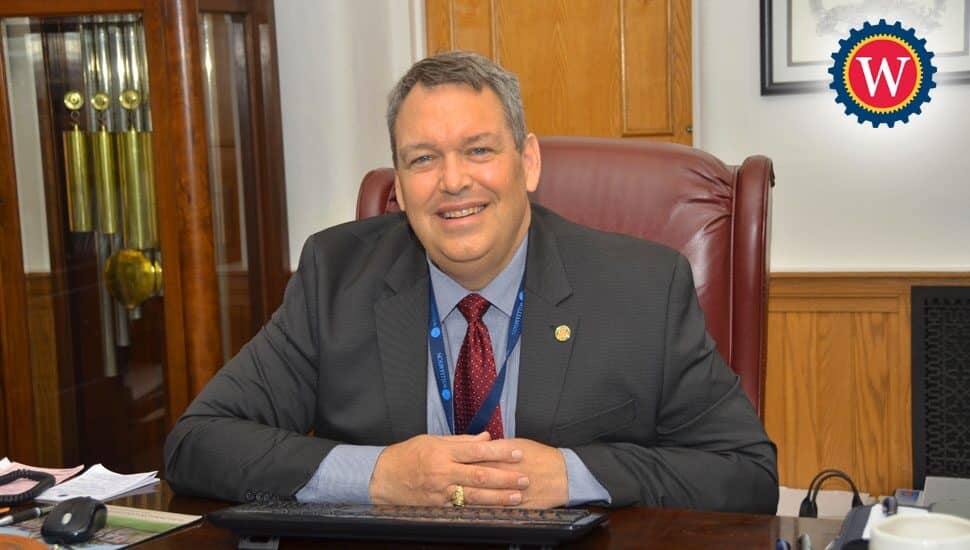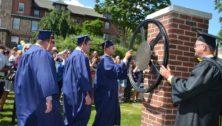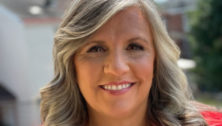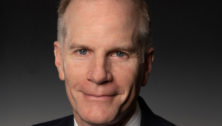Chester County Leadership: Michael Rounds, President of Williamson College of the Trades

Delaware County Leadership: Michael Rounds, President of Williamson College of the Trades
Michael Rounds, President of Williamson College of the Trades, spoke with DELCO Today about growing up in Minnesota, his interest in music and football, his decision to go to West Point, and finally become the president of Williamson College of the Trades, a private men’s 3-year junior vocational college near Media frequently referred to as the Harvard of trade schools.
Mike also discussed the jobs he did while growing up, what brought him to Williamson, the priorities he’s focused on, and the challenges ahead for the College. Finally, Michael shared why Williamson is looking nationally and how they are trying to raise the school’s profile and awareness.
Where were you born, and where did you grow up?
I was the oldest of four children, born in Madison, South Dakota where both of my parents grew up. My dad was the first in his family to go to college. He attended a teacher’s college right in his hometown. My mom studied nursing in Minnesota.
After they were married, my Dad taught high school biology and coached football and track at a couple of high schools on Indian Reservations in North Dakota and South Dakota.
My dad got a job as an assistant principal in Anoka, Minnesota, a suburb of Minneapolis when I was in kindergarten, so that is what I consider home.
My Dad stayed at that high school until he retired and my parents still live in that same house today.
What did your parents do?
My dad was a high school principal, and my mom was a nurse but was a stay-at-home mom while we were growing up and did preschool screening once we were all in school full time.
What memories do you have from growing up in Anoka?
Anoka is an Indian word that means a confluence of two rivers, the Rum River and the Mississippi. It is a suburb northwest of Minneapolis. I went to a Catholic school through 8th grade and then to a big public school – but not the high school my Dad was Principal at. We had over 600 in my graduating class.
I had a great childhood – my parents were very supportive and involved. They set a great example for me and my brothers and sister. Despite being busy with his work, my dad made sure to attend every activity and game that he could. Mom always made the family her top priority. They encouraged us to get involved and try out as many activities as we were interested in.
We all took piano lessons, played an instrument in the band, and participated in athletics.
So, we were blessed with loving parents who supported us, but expected us to challenge ourselves, work hard, respect people, and make sure that making it to church every weekend was a priority! I also had a great group of friends that I am still close with today.
Growing up in Minnesota, it seemed like everyone played hockey. There weren’t many indoor ice rinks, so we all played on outdoor rinks. It didn’t take me long to find out that hockey was not going to be my sport – I was not a very good skater.
I still remember seeing my Dad standing out in the subzero temperatures waiting for me to get some ice time with the third-line guys. He was always encouraging me, but I know he was happy when I told him I thought I would move on from hockey and give basketball a try!
When did you start playing football?
Football has always been my favorite sport. My dad played college football and we loved to watch football together. My parents were Vikings season ticket holders back in the day when Fran Tarkenton and the Purple People Eaters ruled the NFC Central and before they built the Metrodome and moved to an indoor stadium.
I started playing tackle football as soon as I could – that was fourth grade and I loved it from the start. I played baseball, and basketball, was on the swim team in junior high, and ran track, but football was always my priority.
By the time I got to high school, my track coach – who was also one of my football coaches – advised me to switch from the 400m to shot put and discus. I really enjoyed those events and they were a great compliment to my development as a football lineman.
What was there about football that drew you in?
I love to compete as part of a team and I also enjoyed the contact. Football is the ultimate team game – the only sport where some players don’t ever touch the ball or get the chance to score. All eleven players have to do their jobs for the play to be successful, so you feel the pressure to do your job well because the other guys are depending on you and you take pride in the accomplishments of the team.
You really have to commit to working hard in conditioning and weightlifting all year round to develop into a good player. I also had great coaches along the way – especially in high school – they were great role models on and off the field.
When did you first notice that you had leadership talent?
As I went through high school, I realized that I was blessed with some gifts and talents that made me good in a lot of things, but not great in any one area – so I guess I was well-rounded. I did well academically, was selected for the National Honor Society, served as a class officer, was president of the band, and was a good football player and captain of the track team my senior year.
I think all of those experiences played a role in my development as a leader, but athletics is where I grew the most as a leader. As I progressed through high school, I realized the responsibility that I had to set the right example for the younger guys and help them. I wanted to be respected and looked up to in the same way I looked up to and respected the upperclassmen on those teams that helped and mentored me along the way.
Did you have any jobs in high school?
I did mow a lot of yards as a kid in the summer when I was in grade school. In junior high, I had summer jobs that included corn detasseling, weeding soybean fields, and working as a janitor at an elementary school.
In high school, I worked at a grocery store bagging groceries and stocking shelves. I didn’t get to work many hours, especially when football and track were in season, mostly weekend hours to earn a few bucks.
Looking back, what lessons did you learn at those jobs that still stay with you today?
When you have a job, you learn the importance of being reliable and taking pride in your work. I wanted to be known as someone who could be counted on to do a good job and was trustworthy.
I also realized that I wanted to get an education so that I had options other than the jobs that I worked in junior high and high school. I wanted to have a job that I looked forward to going to every day.
I think it’s great for every kid to have the experience of working a really physically demanding job like those, where you’re just exhausted at the end of the work day.
What music were you listening to in high school?
I love all kinds of music. I listened to the popular music of the day on the radio, but also appreciated other kinds of music including jazz.
My mom grew up playing the piano and organ in church, so we all took piano lessons when we were kids. I didn’t love it at the time, though, and was happy when I could stop taking piano lessons and switch to trumpet.
I played the trumpet through junior high into high school and was in the summer marching band, concert band, and jazz band. I haven’t picked up a trumpet in a long time, but I appreciate the fact that my family introduced me to music at an early age.
How did you decide to go to West Point?
I wanted to play college football at a Division 1 school. Several small colleges recruited me, but West Point was the only Division I school that showed any real interest. The bigger schools all thought I was too small or too slow or both! I visited West Point’s campus along the Hudson River in New York and even though I had no military background, the leadership, and discipline West Point offered intrigued me – it was not like a normal college!
I decided that I wanted to study engineering in college, and West Point engineering had a great reputation. It was actually the first engineering college in the country. I was impressed with the history and traditions of the place.
My parents encouraged me to give it a try and reminded me I could drop out and come home if it wasn’t a good fit.
My high school buddies, on the other hand, all thought I was nuts. The night before I left to go to West Point for cadet basic training, they threw a big party and we all watched “The Lords of Discipline”, a movie about a pretty intense military school that didn’t look like much fun!
Looking back, was West Point the right choice for you?
Yes, one-hundred percent! As I said, the rigor, structure, discipline, and training helped me develop the skills and habits I needed to lead in the Army. I was able to manage to study mechanical engineering and play four years of college football.
I didn’t get much sleep or free time, but it was all worth it – and we beat Navy 3 of the 4 years, beat Air Force twice, and went to and won two bowl games against Big 10 opponents Michigan State and Illinois.
As you look back over your career, who were the people who saw promise in you and opened doors for you?
I hate to admit it, but I was a pretty average cadet. I fought to be a Dean’s list student. I fought for playing time on the football team. I was challenged to keep up with a very talented group of people!
There were so many people that coached and mentored me along the way. I learned so much from so many of the officers that taught me at West Point. Colonel Kip Nygren was a great mentor for me throughout my Army career. He taught me an aerodynamics course while I was a cadet at West Point and served as Department Head when I returned to teach at West Point years later.
When he retired from the Army, he took a job as Headmaster at Wyoming Seminary near Scranton. He introduced me to Jim Wickenden, who ran a search firm that specialized in education leadership jobs. Jim worked with COL Nygren and several other retiring officers at West Point, helping connect them to colleges and schools that were looking for leaders.
How did you end up at Williamson?
I had a great and very diverse 25-year career as an engineer officer in the army. Teaching at West Point and working as an administrator at our West Point Prep school were assignments that I really enjoyed. As I was starting to look at retiring from the army and what I would do next, my wife and I took a trip to Princeton, NJ to meet with Jim Wickenden and seek his advice on pursuing educational leadership jobs after military retirement. I wasn’t sure if I would be a good fit. I had limited time in teaching and administration and didn’t have a Ph.D. He told me he would keep me in mind and look for the right opportunity.
One afternoon he called me and said, “Hey, I’ve got this school. It’s just outside Philadelphia. I’ve done the search for their last two presidents. Both were retired colonels from the Air Force. He said Williamson was unique and run very much like a military school. It also had the faith component I was interested in. I hadn’t really thought much about a trade-focused college, but with my background in engineering and construction, Williamson intrigued me right away.
I came out for a visit a year and a half before the President was going to leave and before I had decided on when to retire from the army. I met some great, very dedicated people on the staff and faculty – they were passionate about the mission.
One of the things that attracted me to Williamson was that we go to chapel every day. That faith and the Christian values that Mr. Williamson wanted in his school were something that I was looking for and excited about.
But honestly, it was the students that moved me. I realized how special the place was when I talked to them. They were proud of the hard work they were putting in and seemed mature and polite – they really impressed me.
I came back from that visit and told my wife all about it. I told her that if we could get that job when I retired from the army, that would be exactly what I would be looking for because there’s something special going on there, and those kids are great.
So I applied and went through a long interview process and luckily for me, they offered me the job. I retired from the army in the summer of 2013, moved on to campus, and started on July 1st and we’ve been here ever since.
What are the current challenges and opportunities you’re focused on currently at Williamson?
Increasing the student population. Our current enrollment is around 250 students. We bring in about a hundred new students each year, and it’s a three-year program resulting in an associate’s degree, another unique thing. But nobody can transfer in, so the class only gets smaller if someone quits or is dismissed. Next year we’ll bring in 124, which is a big step for us. Our average graduation rate is 72%, but we are striving for an 85% graduation rate.
We’re also bringing in a new electrical program this year and a new curriculum in our other 5 programs. Most associate degrees are two-year programs, but because we spend half of the day in the shops working on hands-on skills and half the day in academics, it takes us three years to graduate, and I think it makes a lot of sense and gives our graduates a real advantage.
At the beginning of COVID in March of 2020, we had to close everything down and send our students home. Luckily over the previous couple of years, we had been upgrading our technology, installing smart classrooms, and incorporating a learning management system called Canvas, which made it possible to continue the school year remotely.
We did the best we could by loaning laptops to students if they didn’t have one, but here’s the reality, you can’t learn a trade, and you can’t be Williamson on your couch at home.
We have about four times the number of applicants that we have room for each year. Our priority of acceptance goes to those with the most financial need. Many students were providing feedback, including “I came to Williamson to get away from this situation at home and it’s hard for me to focus when I’m away from campus.”
So, we got through it. Luckily, we had most of the coursework completed at that point. At least we did the academic pieces. We completed the school year but knew that we could not operate that way in the future. We hired an infectious disease consultant from Main Line Health and put together a plan. We brought the students in and put them in the dorms. We had a lot of restrictions and rules, testing and quarantining, and students were not allowed to leave campus between Sunday night and Friday afternoon. We also had to cancel the whole year of intercollegiate athletics. We made it through – it was tough for everybody, especially students.
This past year, we mandated the vaccine and, outside of wearing masks, returned to a relatively normal routine, including off-campus trips and intercollegiate sports.
You’re really trying to raise Williamson’s profile nationally.
Well, one of the things that surprised me here was that Williamson is the only school of its kind in the country – truly unique. Every big city in this country should have a school like Williamson. Helping young men that don’t have the financial resources to get any further education or training after high school – that’s a great idea.
College is a great choice for many high school graduates, but sometimes we’re too focused on trying to get every kid to college. Did that kid stay and graduate from college? Did they choose the right major and get the right training that led them to a career?
So here at Williamson, we graduate 72% of the most at-risk demographic – young men around the poverty level. How do we do that? We immerse the students in the culture of Williamson. We have expectations and high standards. All students are residents here – they live in a community that’s 24/7 with the support they need.
There is still a stigma that goes along with the trades. Trades are what you do if you aren’t smart enough to get into college. It makes me crazy that many people – including some high school teachers and counselors – think that way. The gifts and talents these young men have in working with their hands – in building, fixing, creating, manufacturing – that is truly a talent and a gift that should be celebrated and encouraged – and guess what? That’s where the jobs are!
When a young man comes here with that interest and ability and realizes that not only can he do something he enjoys and is good at it, he can have a career and not just a job. Many of our graduates might start as a bricklayer or carpenter, or maybe they go into construction management, but if they start as a bricklayer or carpenter, they are capable of being a foreman pretty quickly.
Maybe they will start their own business. Our graduates have no debt, an associate degree and most of them have multiple job offers from great companies when they graduate. We are trying to take that story nationally so that we can offer the opportunity to more young men and hopefully more schools like Williamson will open – our country needs it for a lot of reasons.
Why the focus on taking Williamson national, Mike?
Nationwide, there’s a huge deficit in the trades. We need skilled tradesmen for our economy to grow. We need to bring manufacturing back to our country. This sector has thousands of jobs that are unfilled. This is where the opportunities are. I think we’ve looked down our nose at the trades for so long, and so many are convinced that the only path to success in America is for an 18-year-old to immediately go off to a four-year college after high school graduation. Too many drop out and are left with nothing but student debt to show for it.
Our annual career fairs this year attracted 206 companies from 15 different states. Every Year, companies pay to participate and compete to hire one of less than 80 graduates. If we just had companies from the Philadelphia area show up, that would say we have a shortage locally. But when we have companies from California, Florida, Colorado, Illinois, and Texas that travel all the way to Media, PA to find talent, that tells you we have a nationwide problem.
Williamson is not well known. It is a challenge to run a college where every student has a full scholarship inclusive of tuition, room, and board. So we don’t have much money in the budget to advertise or pay for buses to bring interested young men here for a tour.
We have to find ways for people to get to know us and organizations to partner with us to get the word out to the young men that have the deepest financial need. Williamson can transform their lives, but we need help in raising revenue and awareness in those neighborhoods that have never heard of us.
What do you do with all your free time?
I get up early in the morning to get a workout in at the YMCA and get back in time to be in the chapel at 7:30. Honestly, my best days are when I can be on campus all day with the students, staff, and faculty. I live in a house a hundred yards from my office in Rowan Hall. I do spend a lot of time off campus promoting Williamson and trying to connect with philanthropic people who want to support what we are doing here. There are a lot of social events I attend in the evenings, so by the end of the week, I am pretty drained.
My wife and I love to hike. We love to walk. We go out to Ridley Creek often and walk the trails over there. We are both native Minnesotans, so nothing says relaxation more than going to a peaceful lake and being on the water.
Do you get to read much?
Not as much as I would like to read. I’m not really an avid reader; I listen to a lot of podcasts and stay connected to professional publications.
Do you have a favorite podcast?
There’s this one I just went through, and it’s called Bible in a year by Father Mike Schmitz. It’s literally a 365-day walk through the entire Bible. It was fantastic!
In this Crazy world, Mike, what gives you hope?
My Catholic faith helps me understand that everything we have is a blessing from God and he is in control. You can drive yourself crazy worrying about things you can’t control, or you can look at the things you can control and do the best you can every day. You are always in control of your attitude and leading with a positive attitude and enthusiasm is what gets things accomplished.
Seeing these young men succeed at Williamson gives me hope. So many in my generation think kids are different today – and not in a good way. I hate hearing that because at the end of the day these kids are not really that much different than the kids we grew up with. They need direction and motivation just like we did – they also need to be encouraged, held to a high standard, and challenged – even to the point of failing once in a while. Those failures are the best opportunities for them to really improve.
Finally, Mike, what is the best piece of advice anybody ever gave you?
I think it was probably my Dad, and I think it was around the time I was trying to decide about going to West Point. He said, ‘Don’t be afraid of a challenge – you will never know what opportunities will present themselves – don’t be afraid of taking on something that is really hard. You don’t want to look back and say what if? And if it doesn’t work out, you will be better for the experience.’
When I look back at my life, there is no way that I could have imagined what it was going to be like. I have so many people to thank – but number one on the list is my wife Mary Nell. She is my hero. She sacrificed her career to support my career in the Army. We lived in 16 different houses, apartments, and government quarters in 23 years of marriage before we moved into our house on campus here. It takes a special person to be an Army spouse and raise 3 great sons through so many moves and new duty stations. I am forever indebted to her! We feel blessed to have landed here at Williamson and after 9 years, are still excited about being part of this great mission and great community. We are truly blessed!
Connect With Your Community
Subscribe to stay informed!
"*" indicates required fields
















![95000-1023_ACJ_BannerAd[1]](https://vista.today/wp-content/uploads/2023/03/95000-1023_ACJ_BannerAd1.jpg)































